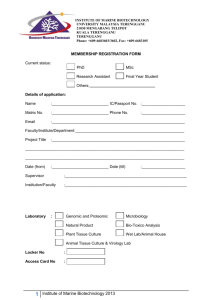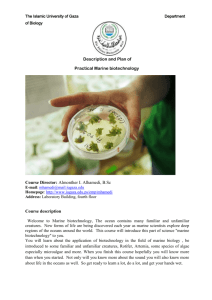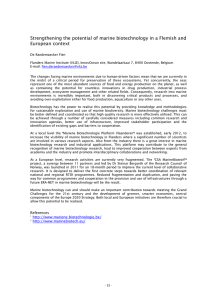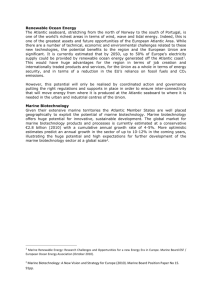MARINE BIOTECHNOLOGY: REALISING THE FULL POTENTIAL OF EUROPE
advertisement
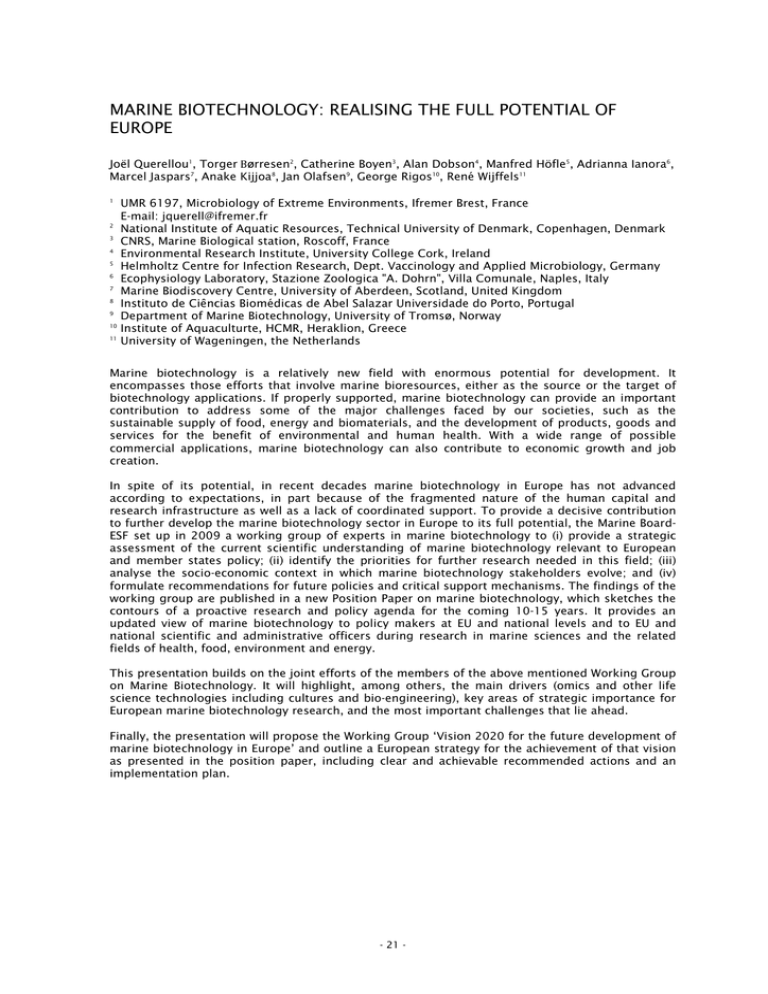
MARINE BIOTECHNOLOGY: REALISING THE FULL POTENTIAL OF EUROPE Joël Querellou1, Torger Børresen2, Catherine Boyen3, Alan Dobson4, Manfred Höfle5, Adrianna Ianora6, Marcel Jaspars7, Anake Kijjoa8, Jan Olafsen9, George Rigos10, René Wijffels11 1 2 3 4 5 6 7 8 9 10 11 UMR 6197, Microbiology of Extreme Environments, Ifremer Brest, France E-mail: jquerell@ifremer.fr National Institute of Aquatic Resources, Technical University of Denmark, Copenhagen, Denmark CNRS, Marine Biological station, Roscoff, France Environmental Research Institute, University College Cork, Ireland Helmholtz Centre for Infection Research, Dept. Vaccinology and Applied Microbiology, Germany Ecophysiology Laboratory, Stazione Zoologica "A. Dohrn", Villa Comunale, Naples, Italy Marine Biodiscovery Centre, University of Aberdeen, Scotland, United Kingdom Instituto de Ciências Biomédicas de Abel Salazar Universidade do Porto, Portugal Department of Marine Biotechnology, University of Tromsø, Norway Institute of Aquaculturte, HCMR, Heraklion, Greece University of Wageningen, the Netherlands Marine biotechnology is a relatively new field with enormous potential for development. It encompasses those efforts that involve marine bioresources, either as the source or the target of biotechnology applications. If properly supported, marine biotechnology can provide an important contribution to address some of the major challenges faced by our societies, such as the sustainable supply of food, energy and biomaterials, and the development of products, goods and services for the benefit of environmental and human health. With a wide range of possible commercial applications, marine biotechnology can also contribute to economic growth and job creation. In spite of its potential, in recent decades marine biotechnology in Europe has not advanced according to expectations, in part because of the fragmented nature of the human capital and research infrastructure as well as a lack of coordinated support. To provide a decisive contribution to further develop the marine biotechnology sector in Europe to its full potential, the Marine BoardESF set up in 2009 a working group of experts in marine biotechnology to (i) provide a strategic assessment of the current scientific understanding of marine biotechnology relevant to European and member states policy; (ii) identify the priorities for further research needed in this field; (iii) analyse the socio-economic context in which marine biotechnology stakeholders evolve; and (iv) formulate recommendations for future policies and critical support mechanisms. The findings of the working group are published in a new Position Paper on marine biotechnology, which sketches the contours of a proactive research and policy agenda for the coming 10-15 years. It provides an updated view of marine biotechnology to policy makers at EU and national levels and to EU and national scientific and administrative officers during research in marine sciences and the related fields of health, food, environment and energy. This presentation builds on the joint efforts of the members of the above mentioned Working Group on Marine Biotechnology. It will highlight, among others, the main drivers (omics and other life science technologies including cultures and bio-engineering), key areas of strategic importance for European marine biotechnology research, and the most important challenges that lie ahead. Finally, the presentation will propose the Working Group ‘Vision 2020 for the future development of marine biotechnology in Europe’ and outline a European strategy for the achievement of that vision as presented in the position paper, including clear and achievable recommended actions and an implementation plan. - 21 -
